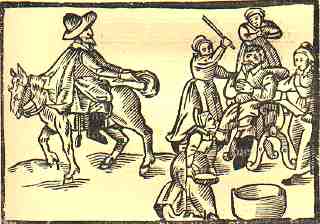Social order and the Shrew
The maintenance of social order is an important issue in the play. The idea that a woman should necessarily be at her father or husband's command is the basis of the "taming" plot, and is a strong influence in the sub-plot of Bianca and her suitors.
A traditional justification for the importance of obedience lay in the belief that the universe was structured hierarchically; in particular, the social unit of the Renaissance family was seen as a microcosm corresponding to the political state, and disorder in the family was thought to lead to disorder in the state. In an age of potential invasions, such as Spain's Armada of 1588, and other sources of insecurity*, social stability was thought to be very important.
At the same time, however, Baptista says that Petruchio must have Katherine's love in order to marry her, and the play illustrates a positive way in which social order is disrupted when Lucentio and Tranio swap roles and costumes.
- Social order and the sexes (link to )
- Renaissance concepts of order (link to )
- Does the play question the need for absolute obedience in children and wives?
Footnotes
-
Insecurity
The ferment of religious reformation, both in Europe and England, was seen as potentially damaging to political stability. That this fear was well founded is shown by the rise in the power of the Puritans during Shakespeare's life.
